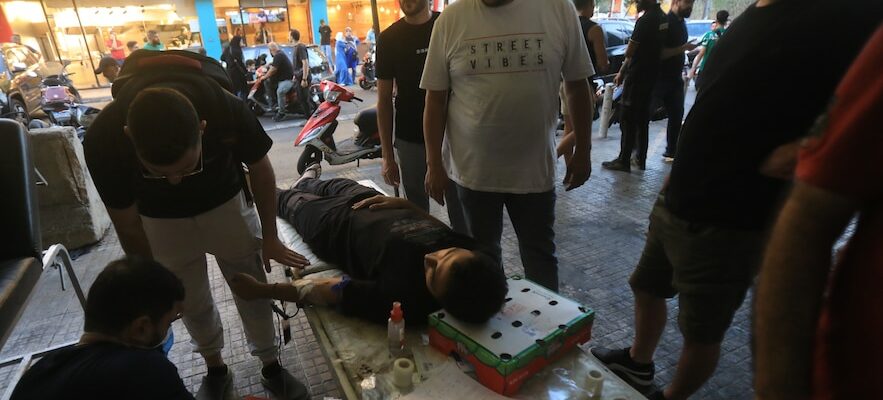Chaos everywhere. On the streets of Beirut on Tuesday, September 17, there were hundreds of injured people, with torn off hands or bleeding abdomens. There were also deaths. The atmosphere had a taste of August 4, 2020, when the explosion at its port devastated the Lebanese capital. Across Lebanon, more than 2,800 people were injured by simultaneous explosions of pagers, the rudimentary means of communication that Hezbollah members use to communicate, convinced that they prevent any interception by Israel. But the Jewish state, towards which all eyes are turned, surprised the Shiite militia with a remote operation of unparalleled scale and scope.
“Hezbollah has never experienced such a security breach in its history,” says Lina Khatib, an associate researcher at Chatham House and a specialist in the Shiite militia. “While the impact on its operational capabilities remains limited, this is a terrible psychological setback, which gapingly exposes Hezbollah’s vulnerability.” Thousands of its fighters have been injured by the little beeper in their pockets, which had been delivered to them from Iran in recent months. Real miniature bombs, supplied by the Shiite organization itself.
Without communication tools, Hezbollah has its back to the wall
While his secretary Hassan Nasrallah, who will deliver a televised speech on Thursday, seems unharmed, the situation of his general staff remains unknown. According to the Saudi press, many leaders of the Lebanese militia have been injured and some of their relatives killed. As of Tuesday evening, Hezbollah promised severe reprisals against Israel. But does it still have the means? On the military level, yes. Israeli experts estimate the arsenal of the Shiite militia at 150,000 rockets, all aimed at Tel Aviv. “But Hezbollah really finds itself with its back to the wall after this attack,” continues Lina Khatib. “On the one hand, the pressure for it to respond to Israel will be immense and on the other, with its security so compromised, it is very limited in its capacities to do so. Each of its military plans requires communication technologies, and Hezbollah can no longer have any confidence in its tools…” The low-intensity war with Israel, which has been waged since October 7 on the southern Lebanese border, is at a turning point.
This operation attributed to Israel comes at a time when, in Jerusalem, Benjamin Netanyahu has been threatening in recent days to dismiss his Minister of Defense, Yoav Gallant, who he believes is too timid about the possibility of a large-scale war with Hezbollah. Furthermore, the Israeli government has just announced a new official objective: to bring home the tens of thousands of Israelis from the north of the country, displaced by the daily shootings of the Shiite militia for almost a year. This implies creating a new buffer zone in southern Lebanon, rather than in northern Israel. It remains to be seen whether this pager attack constitutes a prelude to a military offensive in Lebanon, or conversely whether it is a means of paralyzing the adversary before any irreversible escalation.
A man donates blood in the southern suburbs of Beirut, after explosions of pagers belonging to members of the Lebanese Hezbollah left hundreds injured, September 17, 2024.
© / afp.com/-
Especially since the Lebanese militia has been accumulating setbacks in recent weeks. Since October 7, more than ten of its lieutenants have been eliminated in targeted strikes by the Israeli army. On July 31, it was the body of Fouad Chokr, the military leader of Hezbollah, who was found under the rubble of a building after Israeli fire in the southern suburbs of Beirut the day before. The response is still slow in coming, despite heated rhetoric from Beirut.
These Lebanese hesitations probably come directly from the Tehran regime, the godfather and major financier of the Shiite militia. “For Iran, Hezbollah constitutes the best instrument of deterrence and punishment that the regime could imagine,” underlines Emile Hokayem, of the International Institute for Strategic Studies. “Iran will only decide to really put it into action if it feels that its own sovereignty and its own security are at stake.” An all-out war between Hezbollah and Israel would cause massive damage on both sides, but, as with Hamas in the Gaza Strip, it is likely that the Lebanese organization will find itself largely destroyed and out of action for years. It could have more to lose than the Jewish state, still protected by its Iron Dome.
Nevertheless, the situation on the border between Lebanon and Israel could swing one way or the other. Very quickly after the simultaneous explosions of Hezbollah’s beepers, rumors spread about an imminent offensive by the Israeli army. But 24 hours later, nothing seems to have changed. “Hezbollah was much better prepared for a military offensive than for this kind of operation,” points out Lina Khatib. “We could have thought that an attack of this scale would be the spark that would cause the fire but, paradoxically, it could have reduced the risks of escalation by being a deterrent for Hezbollah. The situation remains very volatile despite everything.” The next few hours and Nasrallah’s speech on Thursday will set the tone for the days to come, which will be historic in the history of Lebanon and Israel.
.
